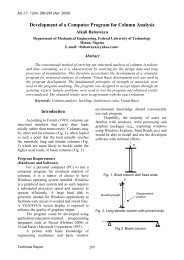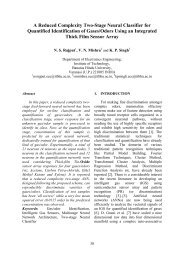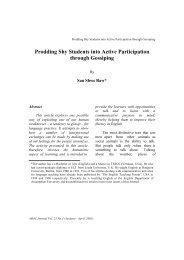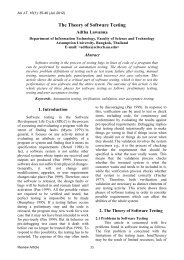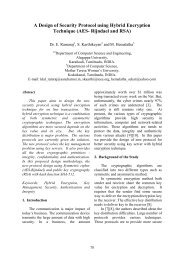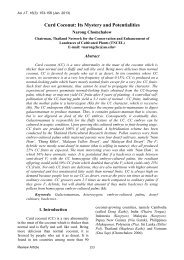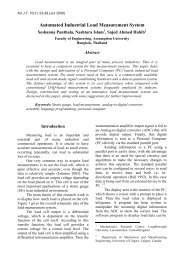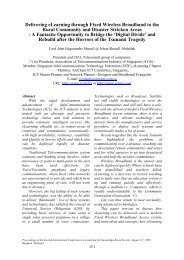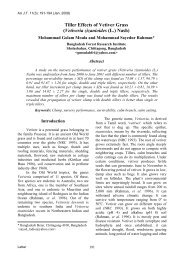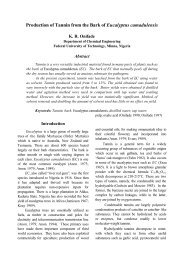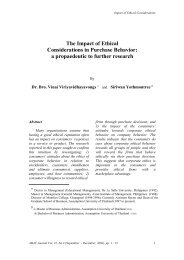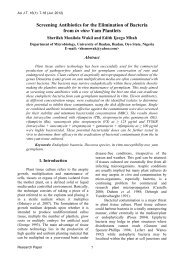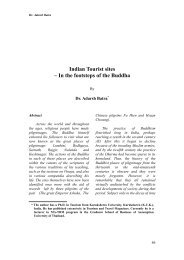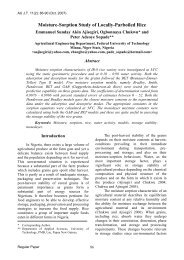PDF format - AU Journal - Assumption University of Thailand
PDF format - AU Journal - Assumption University of Thailand
PDF format - AU Journal - Assumption University of Thailand
You also want an ePaper? Increase the reach of your titles
YUMPU automatically turns print PDFs into web optimized ePapers that Google loves.
multiple choice 12/19 63.2<br />
%<br />
- - 65/77 84.4<br />
%<br />
44/121 36.4<br />
%<br />
77/121=<br />
63.6%<br />
100%<br />
students do not have problems with:<br />
note-taking 6/19 31.6<br />
%<br />
17/25 68<br />
%<br />
71/77 92.2<br />
%<br />
27/121 22.3<br />
%<br />
94/121<br />
=77.7%<br />
100%<br />
teach more than<br />
one subject<br />
14/19 73.7<br />
%<br />
14/25 56<br />
%<br />
31/77 40.3<br />
%<br />
62/121 51.2<br />
%<br />
59/121<br />
=48.8%<br />
100%<br />
Published materials are used for<br />
ESP courses and for language<br />
laboratory use. Courses not for<br />
language laboratory use, however, are<br />
<strong>of</strong>ten compiled by the lecturers. The<br />
majority <strong>of</strong> the lecturers report that the<br />
teaching materials they select are<br />
adequate to cover the needs <strong>of</strong> the<br />
course. More than half <strong>of</strong> the teacher<br />
respondents report that they carry out<br />
ESP materials writing projects and do<br />
ESP research in their institutions.<br />
However, it is difficult to tell precisely<br />
what individuals mean when they use<br />
the term ESP and there is little evidence<br />
<strong>of</strong> awareness <strong>of</strong> debates surrounding<br />
this area. The majority <strong>of</strong> respondents<br />
clearly perceive ESP courses as being<br />
different from GPE courses as relating<br />
closely to students’ major subject areas<br />
but it is clear that these courses are<br />
<strong>of</strong>ten G.P.E. courses which use subject<br />
specific materials.<br />
Results <strong>of</strong> Students’ Responses<br />
The questionnaire for students<br />
consists <strong>of</strong> 107 questions on 8 pages.<br />
One hundred and ninety students (190)<br />
responded to the Questionnaire for<br />
Students. There were 65 males and<br />
125 females. The students’ ages ranged<br />
from 17 to 25. All <strong>of</strong> the students have<br />
completed at least one English course at<br />
university level. The students were<br />
chosen by the lecturers responding to<br />
the questionnaires. There were 83<br />
students from private universities and<br />
107 students from state universities.<br />
Over seventy percent <strong>of</strong> student<br />
respondents reported having difficulty<br />
with specific aspects <strong>of</strong> the four skills<br />
(see Table 22). This finding contradicts<br />
the majority view that they do not have<br />
serious problems with the four skills<br />
themselves in a general sense. The<br />
majority <strong>of</strong> students report spending<br />
only up to six hours each week on<br />
academic work. This seems to indicate<br />
a serious lack <strong>of</strong> motivation.



